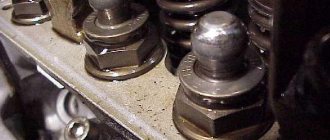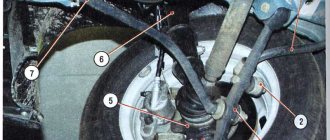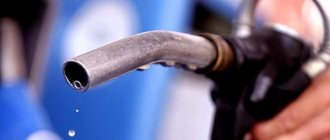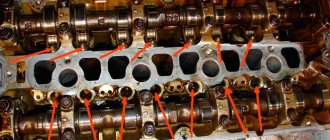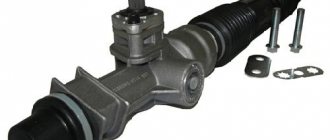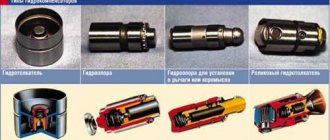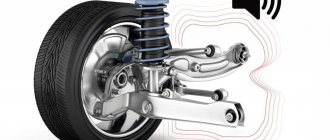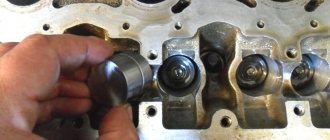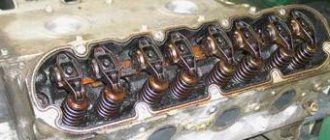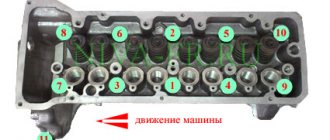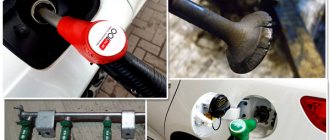The problem of hydraulic lifters knocking is a common problem. You can rebuild the engine, but it will take a long time and is not cheap, or you can use additives for hydraulic compensators (HC). Car owners choose the second option more often. Additives help against knocking and quickly put the car in order. However, there are a number of nuances that the car owner needs to take into account. Additives may not always give the desired effect, and not all formulations may be suitable for this.
I have come across quite a few such compounds on the automotive market. Each product was developed for different types and brands of vehicles. It is difficult for novice car enthusiasts to cope with the choice of a suitable composition. The information presented in my review will help with this.
Purpose of additives for hydraulic compensators
Such compositions are an additive that prevents the formation of deposits in oil channels and hydraulic compensators. The main task of the substance is to reduce the noise level in the mechanism. Reducing noise ensures uninterrupted operation of the mechanism and all structurally important components of the vehicle.
Many additives contain substances that act as a thickener. This increases the effectiveness of additives. Additives can be used with different types of engines - poured into a diesel or gasoline unit.
Possibilities of additive compounds
The capabilities of a specific additive depend on the composition. Before purchasing a product, you should carefully study the label and make sure that the additive is suitable for reducing noise in hydraulic compensators.
All additives in this group have the following capabilities:
- improving the properties of motor oil;
- the quality of the lubricant for individual engine elements increases;
- additional cleaning of engine valves;
- the possibility of using the substance on different types of engines;
- absence of environmental problems and complete safety for humans.
A large number of possibilities allows you to solve the problem of knocking in the main battery. At the same time, the opinion of car enthusiasts is divided on the issue of the possibility of using additive compounds. The composition of the additives is such that they can perform flushing functions. On the other hand, with additives the oil becomes less viscous, easily penetrates through the oil channels and all deposits penetrate inside.
Operating principle
Modern automotive chemistry - modern modifiers, which are a powerful system for increasing friction.
Thanks to their use, the risk of noise and vibrations resulting from sliding with strong changes in the coefficient of friction is reduced.
The latter, by the way, are typical for transmissions equipped with “wet” brakes.
The role of special additives is performed by additives whose molecules are distinguished by powerful polar elements.
The latter guarantee reliable adhesion and improved adhesion characteristics. Such compounds include sulfides and detergents.
Such additives are usually suitable for hydromechanical transmissions, automatic transmissions, differentials, and so on.
Car enthusiasts often ask whether additives can remove suspicious knocking noises in the hydraulic compensator area.
If the supplement is of high quality, then this is possible. But not everyone understands how this process occurs.
Here you need to know the design features and operating principle of the hydraulic compensators themselves.
These devices, depending on the design features, can be of several types, namely hydraulic supports, supports on rocker arms (levers), roller and conventional pushers.
Moreover, regardless of the design features, compensators built on the hydraulic principle always work the same.
Their task is to compensate for the gap between the camshaft in the timing belt and the valve pusher. Engine oil plays a key role in this.
The camshaft cam and spring create a certain force that drives the hydraulic compensator.
When it is at the top point, the oil channels on it coincide with the channels on the cylinder head.
At this moment, engine oil enters the cavity part of the casing, and then through a special recess into the plunger cavity. After the valve opens, the lubricant is directed to the piston area.
The correct operation of the system largely depends on the quality of the oil.
The main malfunctions and noises of the hydraulic compensator are usually caused by violation of operating conditions, untimely oil changes or the use of low-quality products.
Adding special additives to the oil allows you to form a new structure of the part, which not only restores the geometry of key elements, but also allows you to retain “thick” layers of oil.
As a result, the creation of maximum density of the composition and restoration of the functionality of the unit is guaranteed.
In addition, the correct use of additives can eliminate damage caused by excessive wear of the check valve. As a result, the geometry of the ball is restored.
General procedure for using additives for HA
Supplements of this nature are used as a prophylactic agent. The additive can prevent knocking in hydraulic compensators ahead of time. If high-quality oil is used, then there is no need to add active substances. For low-quality lubricants, additives may be the best option.
It is important to note that if the HA is knocking, then special additives alone will not do. An integrated approach is needed to resolve the problem. It is recommended to dismantle the system and find out what the problem is.
If it is not possible to disassemble the functional unit, then to clean contaminated channels it is worth adding an additive to the oil. Before the procedure, it is worth flushing the system and replacing the filter. Supplements are made on a high-quality basis and placed in convenient jars. One container is enough for 5 liters of oil. Before using additives, the engine must be warmed up to operating temperature. When choosing the right additive, you will need to take into account not only the volume of the product, but also the volume of the engine. If up to 5 liters of oil are poured into the engine, then one standard can will be enough.
Answers to frequently asked questions
What additives can be poured into the engine?
The most suitable for worn-out internal combustion engines are tribotechnical compounds and friction geomodifiers. These additives are better than others at increasing the surface of damaged parts and are excellent as formulations for gasoline and diesel SUV engines (as they reliably protect the piston group during heavy vehicle use).
What additive should I choose if it smokes?
The “stop-flow” additive allows you to reduce oil waste after 600 km. It partially restores the elasticity of all plastic and rubber gaskets and seals. As a result, blue smoke from the exhaust is eliminated.
Do regenerative additives actually work?
Yes, additives really work. It’s just important to select the composition based on the symptoms that appear in your engine. With a mileage of more than 50 thousand km, almost all additives are recommended to be used in 3 stages: in the old oil before changing, after a scheduled change and after one full cycle of 10 thousand km (second oil change).
How to choose a suitable additive?
There are a lot of additives for HA on the market. You can choose the appropriate composition using recommendations. There are a number of tips to help you choose the right additive:
- It is better to buy supplements produced by a specific manufacturer. Typically, such compositions are well balanced and of high quality.
- The label shows the composition of the product. You need to read what is used as a thickener and the main components.
- It is recommended to examine the container for counterfeit. In Russia, counterfeits are often found, therefore, you need to purchase products in a specialized store.
- An important parameter is the cost of the additive. A quality substance will not be cheap.
To make the right choice, you need to read reviews from regular users. There are a lot of such comments on the Internet, so it won’t be difficult to understand the issue.
Popular additive compounds for hydraulic fluid
There are several additives that have been sold in the lubricant market for a long time. In Russia today the following are often purchased:
- Liqi Moly. Suitable for restoring the functionality of the HA. With minimal wear, this option is ideal. If the engine is in perfect condition, then the product may not have the desired effect;
- XADO. High-quality products that allow you to tidy up the engine, reduce noise and even completely eliminate knocking from the engine;
- Wagner. The product appeared on the market not so long ago, but has already become popular. Efficiency is high. The substance is supplemented with a special cleaning additive.
The products of these companies are considered one of the most expensive, but the price corresponds to the declared quality. For a small container of additives you will have to pay 700 rubles or more.
What to put in the engine to prevent piston knocking
The worst knock in the engine of a Japanese car is the knock of connecting rods when the bearings wear out, and if it has already appeared, you won’t be able to do anything “quick” about it. Neither more viscous oil, nor later ignition, nor linings (“fur coat”) under the liners help. This can only temporarily slightly muffle the impact of the connecting rod on the crankshaft journal. This is a major renovation. It is necessary to remove the crankshaft, since there is an ellipse on its neck, and grind it under the repair liners, etc. So much has been written about this knock, its tone and the place from which it comes from, but each Japanese engine will have its own knock. Two "knocking" engines will knock differently, but for both, if you disconnect the defective cylinder, the knock, if it has recently started, will disappear; This knock is especially noticeable when releasing the gas. If the engine is diesel, then the picture of connecting rod knock may be slightly different. When moving, pistons in diesel engines come close to the cylinder head, so when the clearance in the connecting rod journal increases, the piston head touches the cylinder head. Therefore, after the “knocking” cylinder is turned off, the rumble due to this “touch” remains and it is very similar to the knocking noise caused by a “slipped” timing belt. You cannot drive an engine that is knocking because of the connecting rod unless you are planning to buy a new engine. “Getting home” with a knocking connecting rod is only possible in a car with EA-81 and EA-82 engines, because The boxer design of these engines makes them extremely rigid. The crankshaft, because it is short, is also stiffer than conventional engines. There is a known case when a knocking engine from this company was used for more than a month. True, they later replaced it without opening it. Connecting rod knocking in the engine occurs only due to violations of operating rules. However, sometimes engines undergo repairs with connecting rod knocking, the cause of which is a loose nut on the connecting rod. If you notice this knocking in time, then perhaps you can do without boring the crankshaft. But in our experience, not a single car owner has been able to notice it in time, before everything is crushed there, since the nuts, once they start to unscrew, unscrew very quickly.
User reviews
Let's present a few reviews from car owners from the Internet:
Sergey, 32 years old
I bought Liqui Molly, it turned out to be a wonderful thing! My car has average mileage, but the knocking noises have become annoying. The result was not long in coming. I will continue to use it.
Matvey, 38 years old
Additives for hydraulic compensators are expensive. Of course, the quality of such compositions is high, but so is the price. I used it, but maybe I bought the wrong supplement, I didn’t get what I needed effectively. I'll also consult with the guys.
Igor Petrovich, 49 years old
Now there is no way to adjust the operation of hydraulic compensators properly, so I bought an additive. Great results, but the price is high. It is not suitable for regular use because it can give the opposite result.
We understand the problem of 4 cylinders Subaru
- Leak diagnostics
- Liquid level control
- Checking the drive belts
Was there a boy?
It’s curious where the information about the 4th cylinder came from, because the entire Russian Internet is replete with articles, discussions on forums and various repair proposals. The concern of car owners can be understood, since most of them are not specialists in Subaru boxer engines, but they have heard a lot about the weak point of this brand. So they gather on forums and share their concerns, opinions and personal experiences.
